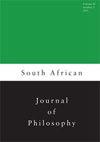重塑乌班图的本体论基础:处理南非的性别暴力问题
IF 0.3
3区 哲学
0 PHILOSOPHY
引用次数: 1
摘要
本文论述了南非持续存在的基于性别的暴力问题。它通过从乌班图的非洲哲学立场来处理性别问题来做到这一点。乌班图的概念很容易被大多数非洲学者用来表明乌班图是中性的,因为它专注于团结的理念。虽然本文认为ubuntu的本体论基础是一个重要的起点,但它试图表明,在非洲哲学领域,在应对性别挑战及其对基于性别的暴力的影响方面,还需要做更多的工作。因此,我们认为,在解决性别问题时,需要以挑战性别问题和确认暴力侵害妇女行为的方式,重新强调ubuntu的概念。虽然ubuntu促进团结、社区和正义,但我们认为,它在解决性别和性别关系问题方面步履蹒跚。因此,我们试图在ubuntu中展示对性别和性别角色的误解,尤其是因为它与格言有关:“我是因为我们是,既然我们是,所以我是”。在这个框架内,我们认为,对妇女的暴力行为可以被解读为对“我们”中的妇女“我”的本体论误解。从性别角度来看,我们寻求让“我”参与“我们”和构成“我”的“我们”。通过这样做,我们认为,在需要解放的“我们”中,存在着一个本体论上不可识别、被侵犯和被压迫的“我”。我们提出了一种重新表述,要求被压迫的“我”积极参与并从本体论的自卑中解放出来,这种自卑使暴力侵害妇女行为变得英勇。本文章由计算机程序翻译,如有差异,请以英文原文为准。
Recasting the ontological foundation of ubuntu: Addressing the problem of gender-based violence in South Africa
This article addresses the persistent reality of gender-based violence in South Africa. It does this by approaching the issue of gender from the African philosophical position of ubuntu. The concept of ubuntu is one that is readily used by most African scholars to show that ubuntu is gender-neutral as it focuses on the idea of togetherness. While this article considers the ontological foundation of ubuntu a significant starting point, it seeks to show that more work has to be done in the area of African philosophy with regard to addressing the challenge of gender and its implication for gender- based violence. Hence, we argue that the conception of ubuntu in addressing the issue of gender needs to be reemphasised in ways that challenge the issue of gender and the validation of violence against women. While ubuntu promotes togetherness, community and justice, we argue that it falters in addressing the issues of gender and gender relations. Therefore, we seek to show the misconception of gender and gender roles in ubuntu, especially as it pertains to the dictum: “I am because we are and since we are, therefore, I am”. Within this framework, we argue that violence against women can be read as indicative of the ontological misconception of the women “I” in the “we”. From a gender perspective, we seek to engage the “I” in the “we” and the “we” that makes up the “I”. By doing this, we argue that there is an ontologically unrecognisable, violated and oppressed “I” in the “we” that needs emancipation. We propose a reformulation that entails an active engagement and emancipation of the oppressed “I” from the ontological inferiority that valorises violence against women.
求助全文
通过发布文献求助,成功后即可免费获取论文全文。
去求助
来源期刊

SOUTH AFRICAN JOURNAL OF PHILOSOPHY
PHILOSOPHY-
CiteScore
1.00
自引率
0.00%
发文量
19
期刊介绍:
The South African Journal of Philosophy (SAJP) is the official publication of the Philosophical Society of South Africa. The aim of the journal is to publish original scholarly contributions in all areas of philosophy at an international standard. Contributions are double-blind peer-reviewed and include articles, discussions of articles previously published, review articles and book reviews. The wide scope of the South African Journal of Philosophy makes it the continent''s central vehicle for the publication of general philosophical work. The journal is accredited with the South African Department of Higher Education and Training.
 求助内容:
求助内容: 应助结果提醒方式:
应助结果提醒方式:


